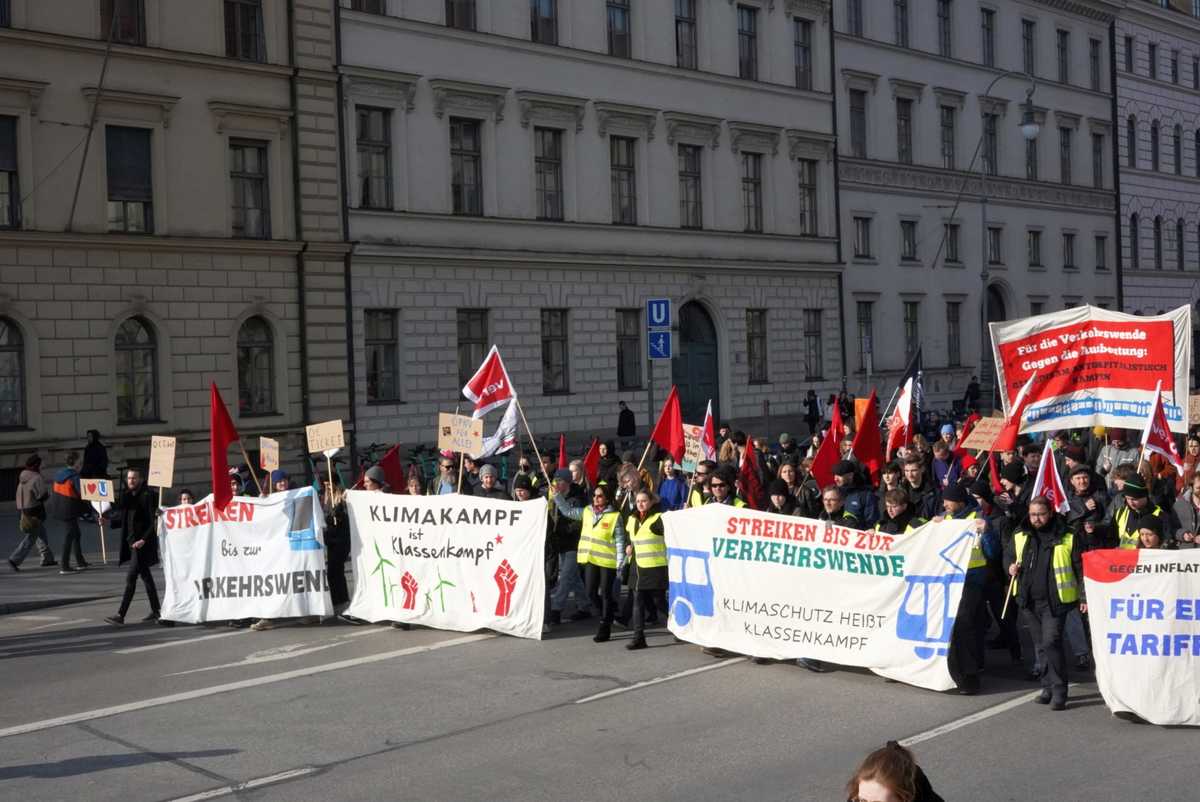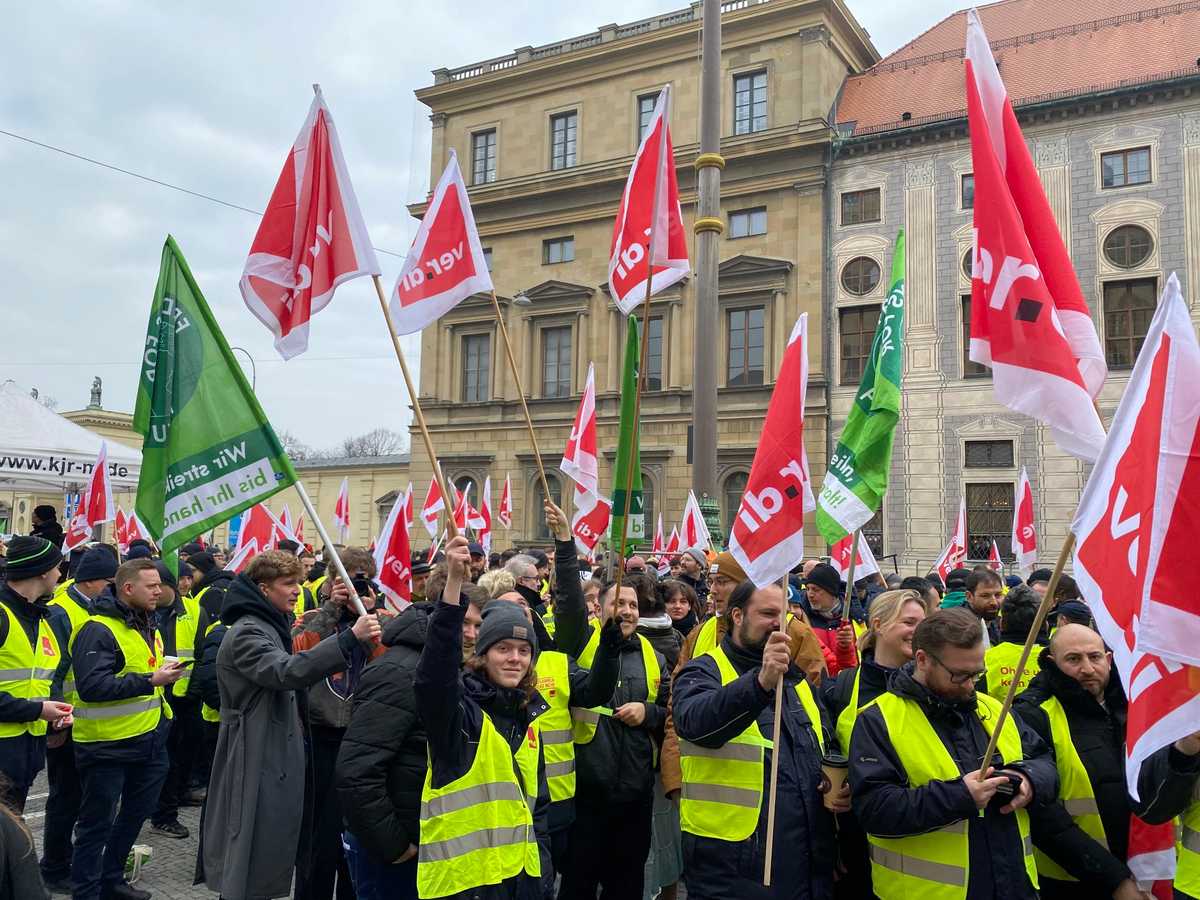On 3 March 2023, on the occasion of the global climate strike, a special political alliance took to the streets in Germany: side-by-side, climate activists and public transport workers went on strike. In at least 30 cities, climate activists visited workers' pickets and brought them along for joint demonstrations. According to Fridays for Future, a total of 200,000 people participated in the nation-wide protests.
The way employers reacted showed that this alliance of workers and climate activists is a potential threat to the ruling class. Steffen Kampeter, CEO of the Confederation of German Employers (BDA), publicly denounced them on the morning of the joint strike day as “a dangerous crossing of the line”. He said that the German service union ver.di was blurring the lines between strikes for collective bargaining and general political concerns, thereby entering the terrain of political strikes. To the delight of campaigners, this accusation contributed to the fact that the joint strike dominated the news that day.
This unity between the labour and climate movement was long overdue: a wider and more affordable public transport system is one of the central measures to achieve socially just climate protection. However, the mobility transition in Germany has so far been made impossible: many employees in local transport work in shifts under terrible conditions and barely make ends meet — with salaries just above the minimum wage. Many therefore decide to quit their jobs. There is already a shortage of tens of thousands of drivers. And this problem will only get worse in the coming years. At the same time, ticket prices are rising steadily and the passenger transport systems, especially in rural areas, are thinned out.
The struggle against wage cuts and the climate crisis belong together
Under the slogan #wirfahrenzusammen (“we ride together”), the nationwide alliance between the climate movement and workers demands both better working conditions and more investment in local transport infrastructure. This shows a refusal to accept any trade-off between social or ecological measures to solve the current problems. This struggle for a good life for all turned words into actions during the climate strike on 3 March, which joined the strike of transport workers and Fridays for Future in a movement for socio-ecological public infrastructure.
But this alliance isn’t just based on programmatic convergence. Both the German trade unions and the climate movement have to tackle their respective decline in membership and growing disillusionment. Their cooperation could be an answer to this dilemma. If they join forces, they could both regain strength by harnessing their respective power. While the trade unionists gain more publicity and legitimacy for their demands during collective bargaining through the participation of Fridays For Future, the climate movement can gain broader social support by focusing on the alliance with workers.
In recent months, cooperation on the ground has taken very different forms: Activists started by organising concrete solidarity for the striking workers — collecting solidarity statements from passengers, confronting politicians with the workers' demands or organising meetings with citizens where workers spoke about their working conditions. In this way, they built broad public solidarity with the workers. In some cases, activists themselves even helped to convince workers to go on strike.
The convergence of struggles has been built systematically
The fact that a labour strike coincided with the climate strike on 3 March is the result of years of bridge-building by trade unionists and climate activists. As early as 2020, climate activists in many places supported striking public transport workers.
The idea of an alliance emerged as a result of a strategic vacuum in Germany’s Fridays For Future branch. The movement slowly died down and did not succeed in appealing to broader segments of society. The slogan of “system change” was on everyone’s lips, but in practice the movement stuck to symbolic actions of civil disobedience or large protests directed at political decision-makers. In 2020, the alliance aimed to bring the climate question into workplaces in order to actively involve broader segments of the working class in the struggle for climate justice – and to add the power of labour strikes as a form of struggle to the climate fight.
Concretely, the organising took the form of small working groups discussing collective bargaining and the mobility transition. However, at the time a joint strike still seemed unrealistic. The local alliances consisted of a handful of people and the climate strikes did not appeal to the majority of public transport workers. First, common forms of action and a common language had to be developed. If climate activists, who are mostly students, want to stand together with public transport workers, many questions arise: How do you build such a nationwide alliance? Which forms of interaction are needed? Locally, there’s a question of how to overcome initial mutual scepticism. Or more concretely: At what time should an alliance meeting be scheduled so that workers can participate too?
The 2020 campaign already achieved initial successes. Externally, the high-profile actions and press statements with Friday for Future gave the public transport strikes more legitimacy. The alliance and the joint action days have also led to a stronger identification of the workers with their collective bargaining round. In some cities, in the course of the social-ecological alliances, company groups were founded that still exist today and are actively helping to build up the strikes. A lot of mutual scepticism could be reduced and the climate movement gained legitimacy in some transport companies. This year it was possible to build on this trust and on the contacts established years ago.
The organic leaders in workplaces and the climate movement used their networks to win over workers and activists to the idea of a renewed alliance. This way, joint days of action could be planned well in advance. Meeting formats that worked well in 2020 served as inspiration for many local groups.
The transport "mega strike"
The campaign is still growing every month. On 27 March, ver.di called for a massive strike in the entire transport sector. In addition to public transport workers, the employees of air, rail and waterborne transport also went on strike. Once again, joint actions by climate groups and transport workers took place in 25 cities as part of the so-called “mega strike”. According to ver.di, this was the largest strike since 1992.
The next logical and necessary step would be for climate and labour movements in other countries to join this struggle. Friday for Future’s greatest achievement is that it built a global movement for a global problem. Accordingly, we should set up common European — or, even better, global — demands for a radical mobility transition, and plan common days of action and strikes. An internationalist climate turn of the trade unions and a labour turn of the climate movement could strengthen both social and ecological progress.
We invite interested parties to a first report and exchange on 11 Apr 2023 at 07:00 PM CET. You can join under this link.
Franziska Heinisch is a writer and activist. She works as an organizer and lives in Berlin.
Julia Kaiser is a sociologist researching socio-ecological transformation conflicts and alliances. She is part of the SDS and the party DIE LINKE in Leipzig.
Photos: Twitter


